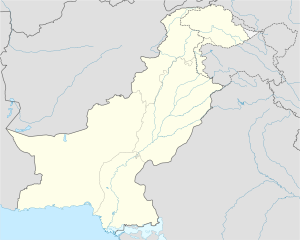Uchch
| Uch اوچ |
|
|---|---|
| Town | |

|
|
| Coordinates: 29°14′N 71°04′E / 29.233°N 71.067°ECoordinates: 29°14′N 71°04′E / 29.233°N 71.067°E | |
| Country |
|
| Province | Punjab |
| District | Bahawalpur District |
| Population | |
| • Total | 22,000 |
| Time zone | PST (UTC+5) |
Uch (Urdu: اوچ; "Ūch"), frequently referred to as Uch Sharīf (Urdu: اوچ شریف; "Noble Uch"), is an historic city in the southern part of Pakistan's Punjab province. Uch is renowned for its collection of shrines dating from the 12-15th centuries that are dedicated to revered Muslim mystics, and which are considered masterpieces of South Asian Islamic architecture. Uch was an important centre in medieval Islamic India, and was an early stronghold of the Delhi Sultanate during the Muslim conquest of the subcontinent.
Uch may have been founded in 325 BCE by Alexander the Great as the city of Alexandria on the Indus (Greek: Ἀλεξάνδρεια ἡ ἐν Ἰνδῷ). The city was located at the confluence of the Punjab's rivers with the Indus. Some historians believe that Uch predates the advent of Bikramjit, when Jains and Buddhists ruled over the area, and that Mithankot or Chacharan Sharif was the true settlement of Alexandria.
In 712 CE, Muhammad bin Qasim conquered Uch, after which the city became one of the leading centres of Islamic studies in South Asia. Following the schism between the Nizari and Musta'li sects of Ismaili Shi'ism in 1094, Uch became a centre of Nizari missionary activity for several centuries, and today is home to several tombs of prominent Nizari pīrs.
...
Wikipedia

